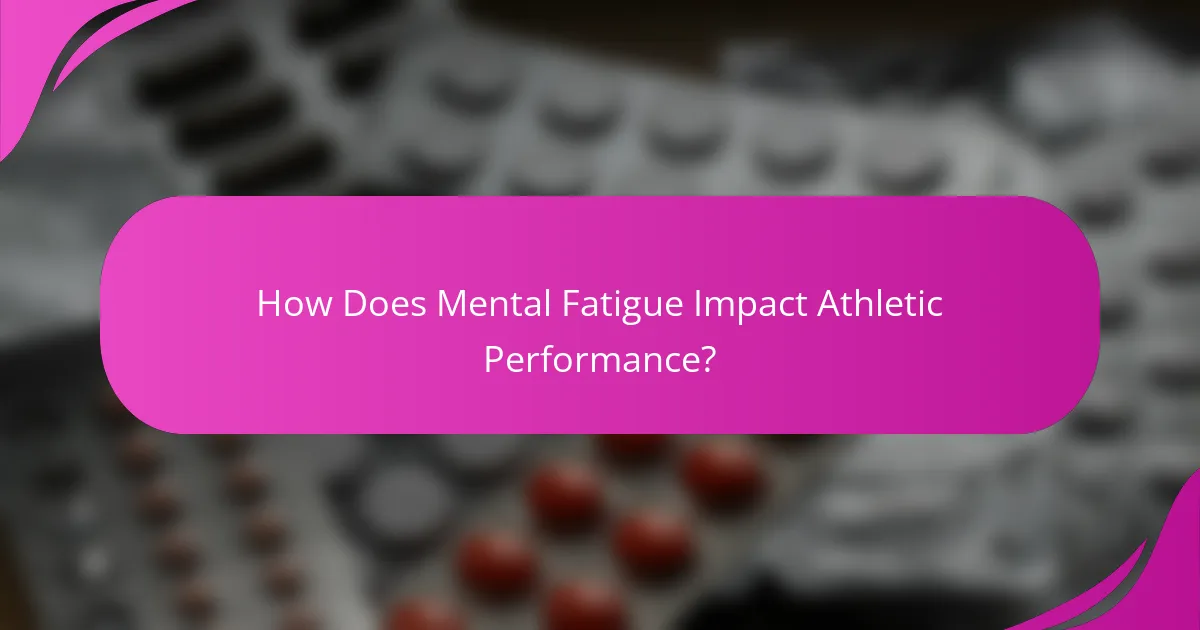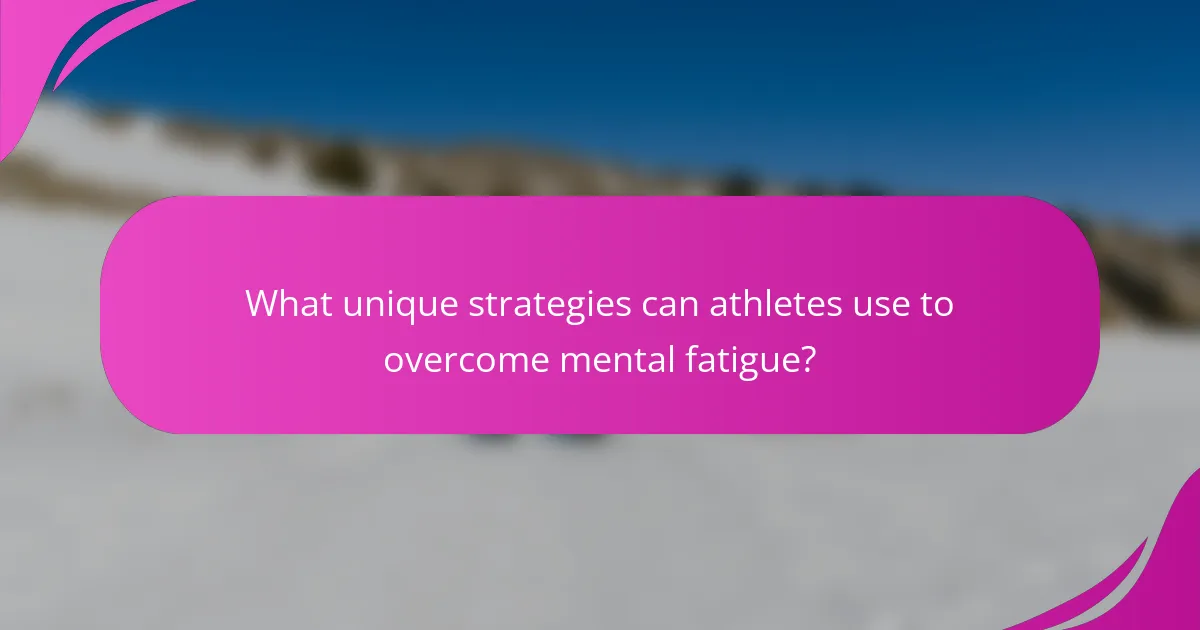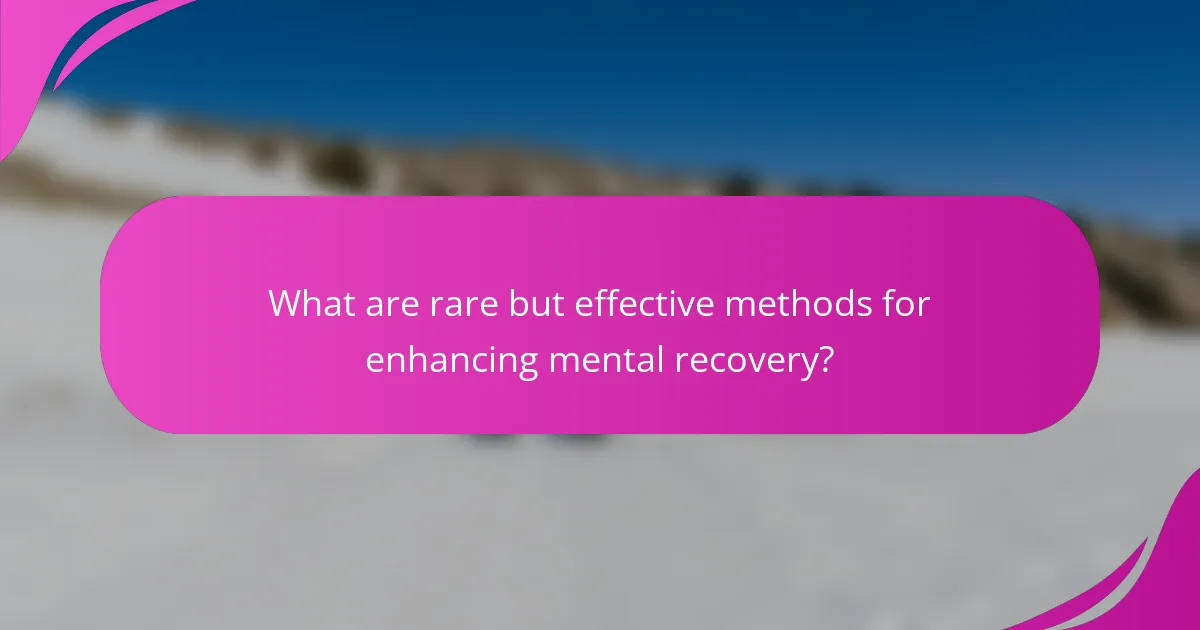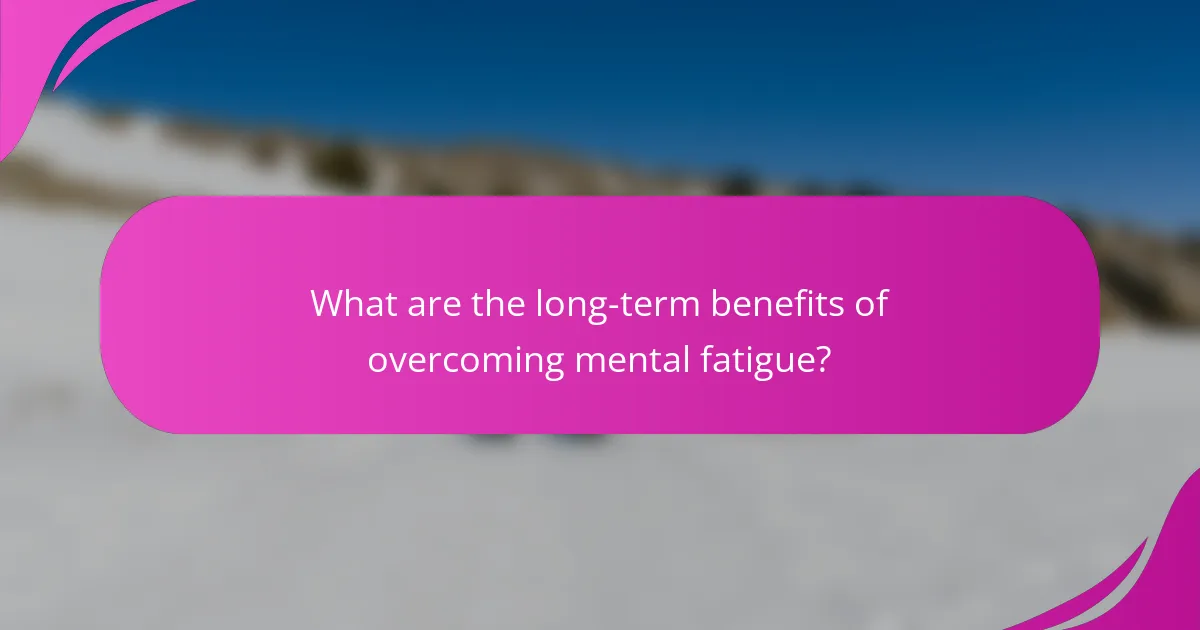Mental fatigue can severely hinder athletic performance, leading to decreased focus and increased injury risk. This article explores the causes of mental fatigue, strategies to enhance recovery, and the importance of a supportive environment. Techniques such as mindfulness training and structured recovery periods can improve mental resilience and overall performance. Understanding these aspects is crucial for athletes aiming to overcome challenges and maintain peak performance.

How does mental fatigue impact athletic performance?
Mental fatigue significantly impairs athletic performance by reducing focus, motivation, and reaction times. This decline can lead to suboptimal training outcomes and increased risk of injury. Athletes experiencing mental fatigue may struggle with decision-making and consistency in their performance. Research indicates that mental recovery strategies, such as mindfulness and adequate rest, can enhance recovery and improve overall performance.
What are the signs of mental fatigue in athletes?
Mental fatigue in athletes manifests through various signs, including decreased motivation, lack of focus, irritability, and physical exhaustion. These symptoms can hinder performance and recovery. Recognising these signs early is crucial for effective management. Strategies such as rest, mindfulness, and proper nutrition can enhance recovery and mitigate mental fatigue.
Why is it important to address mental fatigue?
Addressing mental fatigue is crucial for athletes as it enhances recovery and performance. Mental fatigue can impair focus, decision-making, and motivation, leading to suboptimal training outcomes. Research indicates that mental fatigue reduces physical performance by up to 20%. By managing mental fatigue, athletes can improve their resilience and overall well-being, facilitating better recovery and reducing the fear of being forgotten in competitive sports.

What are common causes of mental fatigue in athletes?
Common causes of mental fatigue in athletes include overtraining, lack of recovery, and high-performance pressure. Overtraining can lead to physical exhaustion and diminished motivation. Lack of recovery disrupts mental clarity and focus. High-performance pressure creates anxiety, impacting mental resilience. Addressing these factors is essential for enhancing recovery and overcoming mental fatigue.
How does training intensity contribute to mental fatigue?
Training intensity significantly contributes to mental fatigue by depleting cognitive resources and increasing stress levels. High-intensity workouts elevate the production of cortisol, a hormone linked to stress, which can lead to feelings of exhaustion and decreased motivation. As athletes push their limits, mental fatigue can hinder recovery, impacting overall performance. Effective recovery strategies, such as proper nutrition and rest, are essential in mitigating these effects and enhancing mental resilience.
What role does competition stress play in mental fatigue?
Competition stress significantly contributes to mental fatigue in athletes by increasing anxiety and reducing focus. This stress often stems from the fear of being forgotten or overlooked, which can hinder recovery and performance. Athletes may experience unique mental fatigue when they perceive high competition levels, leading to a diminished ability to cope with training demands. As a result, effective recovery strategies are essential to combat this mental fatigue and enhance overall performance.

What unique strategies can athletes use to overcome mental fatigue?
Athletes can overcome mental fatigue by implementing unique strategies such as mindfulness training, structured recovery periods, and cognitive reframing. Mindfulness training enhances focus and reduces anxiety, enabling athletes to perform better under pressure. Structured recovery periods ensure mental breaks, allowing the brain to rejuvenate. Cognitive reframing helps athletes shift their perspectives, transforming negative thoughts into positive affirmations, which boosts motivation and resilience.
How can visualization techniques enhance recovery?
Visualization techniques significantly enhance recovery by reducing mental fatigue and improving focus. These techniques help athletes mentally rehearse successful performances, leading to increased confidence and reduced anxiety. Research shows that visualization can activate similar brain pathways as actual physical practice, promoting muscle memory and cognitive readiness. This method not only aids in emotional recovery but also fosters a positive mindset, essential for overcoming the fear of being forgotten in competitive environments.
What is the impact of rest and recovery on mental fatigue?
Rest and recovery significantly reduce mental fatigue, enhancing athletes’ performance. Adequate rest improves cognitive function, decision-making, and emotional resilience. Studies show that athletes who prioritise recovery experience lower levels of stress and burnout. This unique attribute of recovery is crucial for maintaining mental clarity and focus during training and competition.
What are effective rest strategies for athletes?
Effective rest strategies for athletes include prioritising sleep, incorporating active recovery, and utilising mental relaxation techniques. Quality sleep enhances physical recovery, while active recovery, such as low-intensity workouts, promotes circulation. Mental relaxation techniques, like mindfulness or visualization, reduce mental fatigue and improve focus. Each strategy contributes to overcoming the fear of being forgotten and supports overall athletic performance.
How can nutrition influence mental recovery?
Nutrition significantly influences mental recovery by providing essential nutrients that support cognitive function and mood regulation. A balanced diet rich in omega-3 fatty acids, antioxidants, and vitamins can enhance brain health, reduce fatigue, and improve overall mental resilience. For athletes, optimal nutrition helps mitigate stress and anxiety, fostering a quicker recovery from mental fatigue. Consuming nutrient-dense foods can lead to improved focus and motivation, ultimately aiding in overcoming the fear of being forgotten and enhancing performance.
What foods support cognitive function and recovery?
Foods that support cognitive function and recovery include fatty fish, blueberries, turmeric, broccoli, pumpkin seeds, and dark chocolate. These foods contain nutrients that enhance brain health and reduce mental fatigue.
Fatty fish, such as salmon, are rich in omega-3 fatty acids, essential for cognitive function. Blueberries contain antioxidants that improve memory and brain health. Turmeric has curcumin, which may enhance mood and reduce inflammation. Broccoli is high in antioxidants and vitamin K, supporting cognitive function. Pumpkin seeds offer magnesium, iron, and zinc, crucial for brain health. Dark chocolate contains flavonoids that improve blood flow to the brain, enhancing cognitive performance.

What are rare but effective methods for enhancing mental recovery?
To enhance mental recovery, athletes can employ rare but effective methods such as mindfulness meditation, which improves focus and reduces anxiety. Another method is engaging in creative activities, like painting or writing, which can stimulate emotional expression and reduce mental fatigue. Nature exposure, particularly in green spaces, has been shown to lower stress levels and enhance cognitive function. Additionally, implementing structured downtime, where athletes intentionally disconnect from sports-related thoughts, can refresh the mind and improve overall recovery.
How can mindfulness practices reduce the fear of being forgotten?
Mindfulness practices can significantly reduce the fear of being forgotten by fostering present-moment awareness. Engaging in mindfulness allows athletes to focus on their current experiences, diminishing anxiety about their legacy. Techniques like meditation and deep breathing enhance mental clarity and emotional resilience, enabling athletes to manage stress effectively. As a result, they can cultivate a sense of purpose and connection, reducing feelings of isolation and fear.
What is the role of sports psychology in mental recovery?
Sports psychology plays a crucial role in helping athletes recover mentally by addressing fears and enhancing resilience. It provides strategies for overcoming mental fatigue, enabling athletes to regain focus and motivation. Techniques such as visualization, mindfulness, and cognitive restructuring are employed to build mental strength. Research indicates that athletes who engage with sports psychology report improved recovery times and better performance outcomes. By fostering a positive mindset, sports psychology aids in reducing anxiety related to the fear of being forgotten, ultimately enhancing overall recovery.

How can athletes create a supportive environment for recovery?
Athletes can create a supportive environment for recovery by fostering open communication and mutual encouragement. Establishing a culture of sharing experiences reduces the fear of being forgotten, enhancing mental resilience. Incorporating group recovery sessions promotes accountability and collective healing, which can significantly improve recovery outcomes. Engaging in team-building activities also strengthens relationships, creating a network of support that is crucial for mental and physical recovery.
What practices foster team support and communication?
Fostering team support and communication involves creating an inclusive environment and promoting open dialogue. Regular check-ins enhance mental recovery for athletes, ensuring they feel valued and heard. Establishing trust through team-building activities strengthens relationships, reducing the fear of being forgotten. Encouraging feedback fosters a culture of support, vital for mental well-being.
How can coaches help athletes manage mental fatigue?
Coaches can help athletes manage mental fatigue by implementing structured recovery strategies. They can encourage open communication, fostering an environment where athletes feel comfortable discussing their mental state.
Incorporating mindfulness techniques can enhance focus and reduce anxiety. Coaches should also promote balanced training schedules that prioritise rest, recognising the unique attributes of each athlete’s mental resilience.
Regular check-ins can identify early signs of mental fatigue, allowing for timely interventions. As a result, athletes can maintain peak performance and avoid burnout.

What are the long-term benefits of overcoming mental fatigue?
Overcoming mental fatigue offers long-term benefits that enhance athletic recovery and performance. Improved focus and concentration lead to better training outcomes. Enhanced resilience helps athletes manage stress effectively, reducing the risk of burnout. Increased motivation fosters a positive mindset, encouraging consistent effort. Strengthened mental health contributes to overall well-being, promoting longevity in sports. Enhanced recovery processes allow for quicker adaptation and reduced injury rates. These benefits collectively support athletes in achieving their goals and maintaining peak performance.
How does mental resilience contribute to athletic success?
Mental resilience significantly enhances athletic success by enabling athletes to manage stress and recover effectively. It fosters a positive mindset, allowing athletes to overcome challenges and maintain focus during competitions. Research indicates that resilient athletes demonstrate better performance under pressure, as they can quickly adapt to setbacks and maintain motivation. This unique attribute of mental resilience directly correlates with improved recovery times, leading to sustained athletic performance. As a result, athletes who cultivate mental resilience often achieve higher levels of success in their sports.
What are best practices for maintaining mental health in sports?
To maintain mental health in sports, athletes should prioritise recovery, manage fatigue, and seek support. Implementing structured recovery routines enhances mental resilience. Engaging with sports psychologists can provide strategies to overcome mental fatigue. Regular communication with coaches and peers fosters a supportive environment. Additionally, mindfulness practices and physical activities promote emotional well-being.
What common mistakes should athletes avoid in recovery?
Athletes should avoid neglecting mental recovery, overtraining, improper nutrition, and inadequate hydration. These mistakes can hinder performance and prolong recovery. Mental fatigue can impede recovery; therefore, athletes must prioritise rest and mindfulness. Additionally, maintaining a balanced diet and proper hydration supports physical recovery.
What expert insights can enhance mental recovery strategies?
Expert insights can significantly enhance mental recovery strategies for athletes by focusing on resilience-building techniques and mental skills training. Incorporating mindfulness practices can reduce anxiety, while goal-setting fosters motivation. Cognitive behavioural strategies help athletes reframe negative thoughts, promoting a positive mindset. Additionally, peer support systems provide emotional reinforcement, which is crucial in overcoming feelings of isolation and fear of being forgotten. Implementing these strategies can lead to improved mental fatigue management and overall recovery.